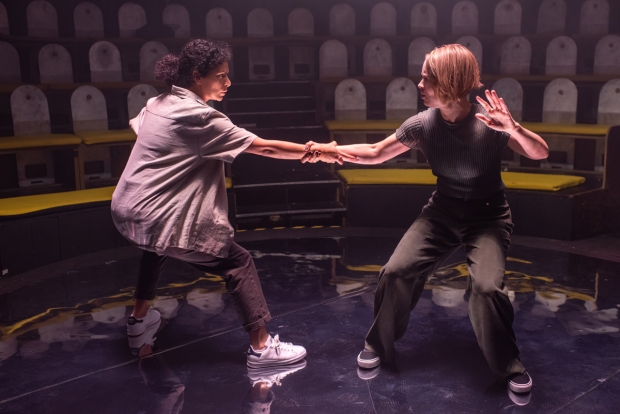”Sap” at Roundabout – Edinburgh Fringe review

Roundabout, with its welcomingly intimate coliseum of raked seating, has long been a hotbed (even moreso in an extraordinarily toasty Edinburgh summer) of new writing and artistic novelty. The same is demonstrated with all the necessary poise in Sap, Rafaella Marcus’ new twist on themes brought up in Ovid’s Metamorphoses.
It’s not the first time (even this year) that contemporary tales have taken their inspiration from Ovid’s tales – Ali Smith’s Girl Meets Boy dabbles with questions of gender and sexuality in a bright, lively fashion.
Marcus’ narrative, based on Ovid’s tale of Apollo pursuing a nymph (Daphne), only for her to transform into a laurel tree, is less ebullient than Smith’s – though not without some wonderfully humorous moments. Melding the classics with contemporary themes around bisexuality and lesbianism (augmenting Ovid’s focus on Daphne’s dedication to Apollo’s sister Artemis), it’s a whip-sharp two-hander with the sort of surety that’s often hard to find during the Fringe. The plot charts Daphne’s love life, starting with string-less flings and into vibrant thrills of finding committed, long-term love.
The play falters slightly, perhaps, as it slides into the psychological thriller territory and loses the mysticism of the romantic opening third. It feels as though further aspects to the link between the two characters played by Rebecca Banatvala, both as Daphne’s one-night-stand and possible one-true-love could be explored, especially as Ovid also played around continually with notions and constructions of gender.
Guilt and anxiety is eventually replaced by sheer terror – and it’s only when the rush of nature’s embrace provides a release from male violence that things return to more galvanising territory.
Director Jessica Lazar does some fantastic things here, given there are simply two figures on a bare stage, while the reflective surface of Ruta Irbite’s set provides a murky mirror for the action that unfurls above. Jessica Clark’s Daphne is a warm, frank protagonist, while Banatvala achieves something subtler but no less impressive. A top-notch hour of play.










